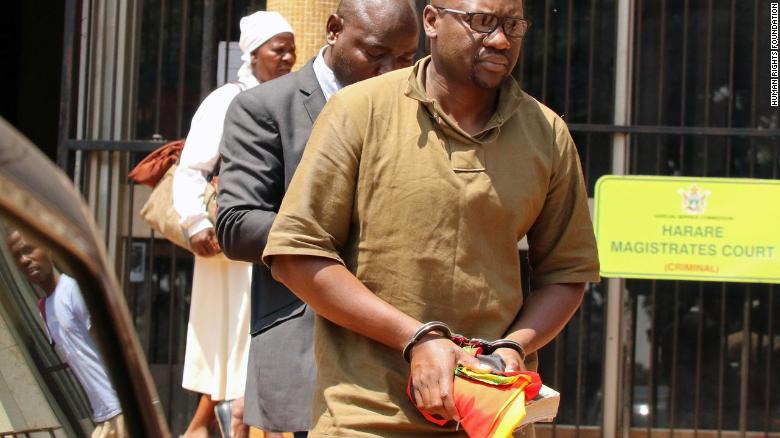
When Mugabe stepped down unexpectedly in 2017, after 37 years in power, there was widespread jubilation, but that quickly dissipated as it became clear that it was business as usual for the new government.
His protests became popular and caught the attention of the Mugabe regime who detained him for “inciting public violence.” Mawarire was released a day later after mounting public pressure.
“Seeing Robert Mugabe step down was unbelievable,” said Mawarire. “The atmosphere was just euphoric. It was something none of us expected to see in our lifetime.”
“The expectation was that from here on truly things are going to get better because there’s no way they can get worse. Robert Mugabe was the worst.”
Fierce crackdown
Add to that a fierce crackdown on any type of criticism of the government and the future of Zimbabwe looks bleak.
“We’re in a country where the basic freedoms that are provided for in the constitution for citizens are being blatantly violated. People are not allowed to speak freely, the amount of arrests that have taken place of people who have spoken out or against the government is shocking,” said Mawarire.
Mawarire claims that, “In just two years, Emmerson Mnangagwa has charged more people who have spoken out against the government than Robert Mugabe did in 37 years.”
CNN cannot independently verify those claims. We contacted Zimbabwe’s information minister about Mawarire’s claims — but did not receive a response.
A thorn in government’s side
He, along with trade union leader, Peter Mutasa, were charged with attempting to overthrow the government and sent to the country’s notorious Chikurubi maximum security prison.
Mawarire was released on bail almost two weeks later.
“It’s what I saw in that prison that was deeply, deeply traumatizing and disturbing,” Mawawire said.
“The men who had been arrested and taken from their homes and falsely accused of participating in this protest had been beaten. Many of them had broken limbs and we also had a lot of underage people arrested. I think the youngest was 15 years old.”
That’s when Mawarire understood how far the regime was willing to go to silence dissent, he said.
‘A contempt for basic freedoms’
Amnesty International has also criticized Mnangagwa for his “blatant contempt for basic freedoms.”
In an August 26 statement, Muleya Mwananyanda, Amnesty International’s deputy director for Southern Africa said, “What we have witnessed in Zimbabwe since President Emmerson Mnangagwa took power is a ruthless attack on human rights, with the rights to freedom of expression, peaceful assembly and association increasingly restricted and criminalized.
“The authorities … have demonstrated that there is no space for dissent in the so-called ‘new dispensation.’ Time and again they have resorted to the same brutal tactics that were used by President Mnangagwa’s predecessor Robert Mugabe to clampdown on human rights.”
The minister of information did not respond to requests for a comment on the Amnesty statement.
President Mnangagwa has said previously that his regime will apply “the rule of law without exception.”
Different levels of brutality
Eleven months after his arrest, Mawarire is still awaiting trial.
His bail conditions demand he reports to the police once a week and international attention on his cause often results in what he describes as “the regime punishing me,” accusing him of being funded by the West and making an example of him.
“There is a difference between protesting under Robert Mugabe and Emmerson Mnangagwa,” Mawarire said, describing what he said are different levels of brutality under the two leaders.
“Mnangagwa is prepared to kill people and he’s done it. He’s prepared to deploy the military with live ammunition and shoot into a group of protesters. He’s done that twice in two years.”
On August 1, 2018, and in January 2019, the Zimbabwean government did indeed send the military into crowds with live ammunition, tear gas and water cannons used to quell protests.
So far nothing has come of it and the information minister also did not respond to a request on the status of the investigation.
A sense of hopelessness
As Zimbabwe’s economy continues to spiral into free flow and protesters are met with force, a sense of hopelessness envelops the country, said Mawarire.
“As long as Zanu-PF is in power, as long as the same people are running the country … there will be no change, It’s the same bus, different driver,” said Mawarire, in a reference to Mugabe’s Zanu-PF party, which has been in power in Zimbabwe since the country gained independence in 1980.

